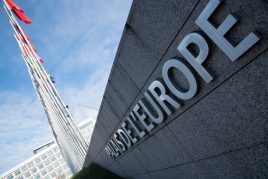(Strasbourg) “Last year the United Nations General Assembly adopted a resolution declaring 15 March the International Day to Combat Islamophobia. In the Council of Europe, we consider this important development as a resolute step of the international community to fighting anti-Muslim racism and hatred as well as all forms of discrimination against Muslims”. This is stated in an opinion piece entitled “A Europe of fraternité” by Alexandre Guessel, Special Representative of the Secretary General of the Council of Europe on antisemitic, anti-Muslim and other forms of religious intolerance and hate crimes. “Indeed here, in the Council of Europe, we have chosen to discuss anti-Muslim racism and hatred instead of Islamophobia as this last term is more widely used in a political lexicon while we concentrate on legal terms”.
“Addressing any problem should start by acknowledging its existence and by analysing ourselves first of all. Europe takes pride in being a place of respect for human rights, the place where individuals enjoy their freedoms, and can peacefully live while their diversity and equality is respected and guaranteed. These are values that we consider universal” and we “are committed to pass them on to future generations with ever stronger foundations”. “These values – Guessel added – concern all Europeans irrespective of religious affiliations, real or perceived. No one can be excluded, any discrimination must be identified, fought against if it has effectively occurred, and preferably prevented before it happens”. “In the broad Europe of our 46 Member States, Muslim populations have lived for centuries. Muslims are an integral part of Europe. They are as European as those who belong to other traditional European religions – Christianity and Judaism. No one can reasonably dispute it”. These are crucial months for the Council of Europe. Following the aggression against Ukraine, Russia was expelled from this international Organisation that covers the whole continent with its 46 Member States. In Strasbourg, work continues on the historic values that have shaped the Council – the first European supranational institution – since its establishment in 1949: democracy, the rule of law, and the defence of human rights (through the European Court of Human Rights). On 16 and 17 May, the Heads of State and Government of the Member States will be meeting in Reykjavik, the capital of Iceland, to discuss the future of the Council of Europe. The Holy See is represented in the Strasbourg-based institution by a permanent observer, currently Mgr. Marco Ganci.

